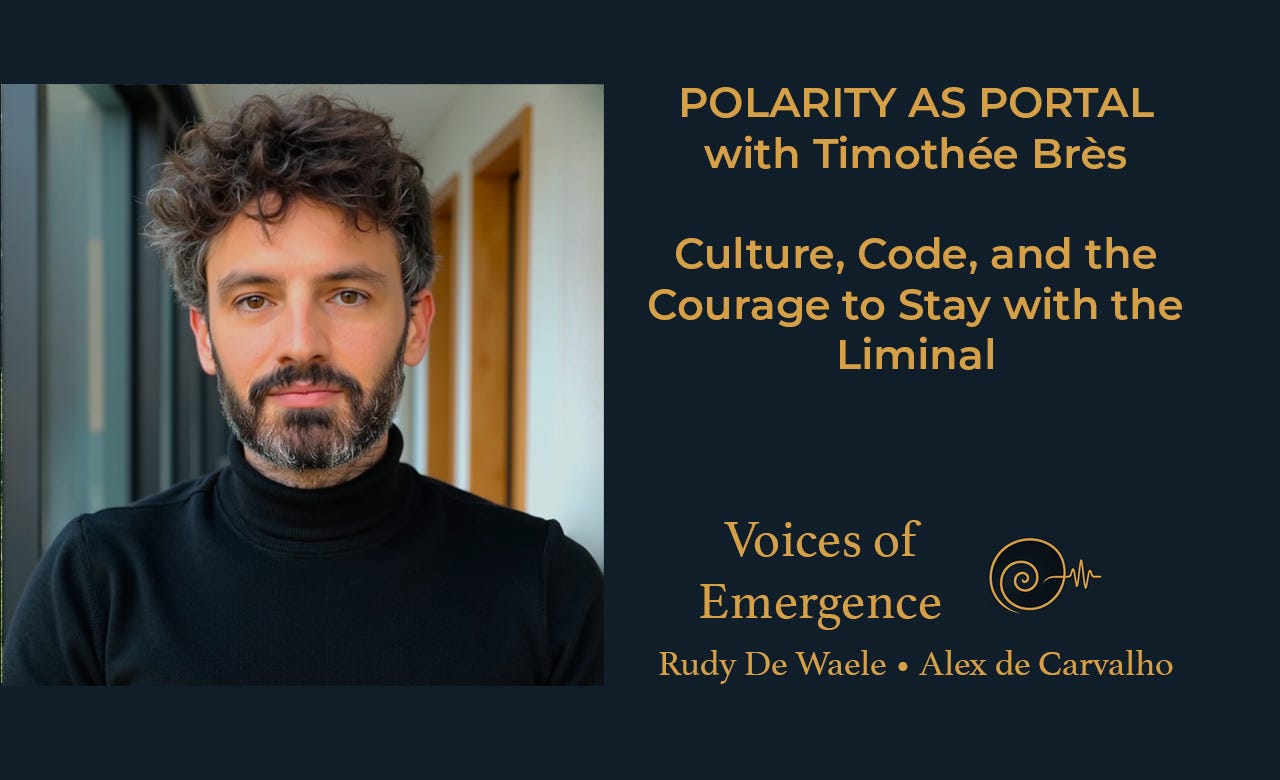Polarity as Portal
On Finding My Voice and Walking the Edges with Timothée Brès: What AI, Polarity, and Shadow Work Taught Me About Expression
Before diving into this post, I want to thank you.
If you’ve been reading these Substack essays for a while, or even just now discovering them, this space has become something meaningful to me. I’ve learned more about myself through the act of writing here than I expected.
And I probably wouldn’t have started without AI, which helped ground my thoughts and give voice to them.
Professionally, I’ve always known how to write: strategic memos, market positioning decks, business cases. Corporate visions. Startup plans. I had a clear voice in the business world. But when it came to writing about what I truly care about—consciousness, healing, the deeper layers of reality—I didn’t know how to begin. I didn’t know if this kind of writing would land or if it had a place outside my private notebooks.
AI gave me a companion to think with. A nonjudgmental mirror that helped me put words to the things I’d long carried inside.
I grew up living between worlds: between cultures, continents, and later, between personas. The rational strategist who knew how to play the game. And the seeker who began noticing synchronicities, tracking dreams, encountering archetypes, and listening for the quiet voice beneath the noise. Jung1 was a lifeline. He gave language to things I had felt but couldn’t name. Through him, the world began to re-enchant like a GGM2 novel.
And now here we are, somehow at the crossroads of all those worlds.
A Portal, Not a Problem to Solve
In this week’s podcast episode on Voices of Emergence, Rudy de Waele and I had the pleasure of speaking with Timothée Brès, someone who has been living in that in-between space. His work blends somatics, ritual, technology, and cultural design, and what struck me most was how he holds polarity.
We often think of masculine and feminine as opposites, something to balance or resolve. But for Timothée, polarity isn’t a problem to solve. It’s a portal. Something we walk through when we stop taking sides and start paying attention to what happens in between:
“The more we can master this polarity within us and with others, the deeper we can go.”
That struck a chord. I’ve spent years toggling between the more assertive, structured self I honed in business, and the more fluid, intuitive part of me that only surfaced in safe spaces or in solitude. This conversation reminded me that those parts don’t need to be in conflict. They’re meant to be in dialogue. It’s in the tension that something new can emerge.
AI as a Mirror, Not a Master
We also explored something that’s been alive for me personally: the use of AI for inner work.
Timothée doesn’t see AI as a tool to optimize our lives. He sees it as a kind of mirror, one that reflects back what we already carry, sometimes more clearly than we can see ourselves. If you ask the right questions, it can surface truths you’ve been avoiding. Patterns. Blind spots. Parts of yourself you haven’t quite made peace with.
But it’s easy to get caught up in the insight and skip the integration. As Timothée put it:
“You cannot be more wise than your nervous system allows.”
It’s a reminder: insight isn’t the same as transformation. Knowing something isn’t enough. The body has to catch up. Without that, AI becomes just another escape route, a shiny new way to bypass the work—or to get lost in it.
The Edge We’re Living On
What I enjoyed about this conversation is that it didn’t try to sell a vision of the future. It didn’t rush to solutions. It stayed with the discomfort, the complexity, the not-knowing.
And yet, it still pointed to something hopeful.
Maybe we are living between worlds right now. One foot in the systems that are breaking down. One foot in something we’re still learning how to name.
Lately, I’ve been asking: what’s ready to emerge in the world now?
And maybe that’s the invitation of this moment: not an escape into utopia or collapse into cynicism, but to hold the tension of the in-between with presence. To build small pockets of coherence in our bodies, our relationships, our communities. To let new archetypes arrive, and not the ones we inherited, but the ones the future is asking for.
Timothée’s work lives in that space. And our conversation felt like the contours of what becomes possible when we stop trying to win the polarity war playing out across the world, and instead learn to listen to what it’s trying to teach us.
🎧 Listen to Episode 6: Culture, Code, and the Courage to Stay with the Liminal with Timothée Brès on Spotify, Apple Podcasts, and YouTube.
“Loneliness does not come from having no people about one, but from being unable to communicate the things that seem important to oneself, or from holding certain views which others find inadmissible.”
― Carl Gustav Jung
“No matter what, nobody can take away the dances you've already had.”
― Gabriel García Márquez


